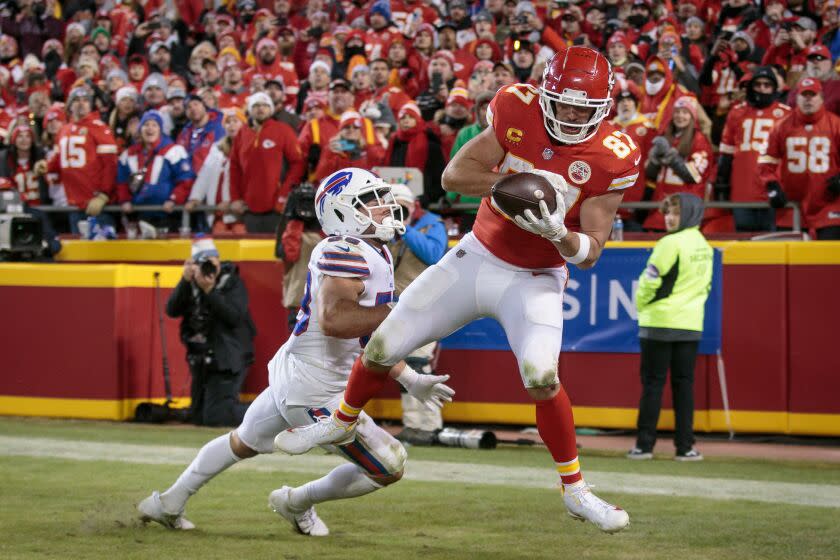
The final quarter of the 2021 AFC divisional round playoff game between the Buffalo Bills and Kansas City Chiefs could not have been more exciting.
Three lead changes.
Five scoring drives.
A 36-36 tie at the end of regulation.
The overtime period, however, could not have been more disappointing.
One coin toss.
One touchdown drive.
Game over.
The most exciting playoff game in recent memory — a quarterback duel between Buffalo’s Josh Allen and Kansas City’s Patrick Mahomes — ended abruptly in a 42-36 Chiefs win when Mahomes connected with Travis Kelce on an eight-yard touchdown pass.
Unlike the thrilling fourth quarter, Allen didn’t get a chance to respond because of the overtime rule the NFL had in place at the time.
A year later, that rule has been changed for the playoffs, which begin this weekend with six wild-card games.
Here’s what you need to know about the rule change:
What was NFL’s previous overtime rule for playoff games?


The previous system was the same as the one still in place for regular-season games. It’s basically a modified sudden death system that gives each team at least one chance to score — with one big exception.
If the team that first possesses the ball in overtime scores a touchdown (not a field goal) on that drive, that team wins. The game is over, with the other offense never getting a chance to take the field in overtime.
If the first team kicks a field goal, the other team gets a possession to either win the game with a touchdown or tie it with a field goal. In the latter case, the game continues until someone scores.
What is the NFL’s new overtime rule for playoff games?
It’s basically a modified modified sudden death system that gives both teams a chance to score.
Period.
If the first team scores a touchdown, the other team gets a possession to tie (and, therefore, extend) the game with a touchdown of its own. Everything else remains the same from the previous format.
When did the rule change?
Team owners voted to amend the postseason overtime rules at the annual league meetings March 29 in Palm Beach, Fla.
Why did the owners modify the rule?


It’s no coincidence that the decision came just weeks after the Bills-Chiefs playoff game.
“In the Buffalo game this year, it was the greatest 20, 30 minutes of football that I’ve ever seen, ever,” Atlanta Falcons President Rich McKay, chairman of the competition committee, said at the league meetings. “To think that it ended that way definitely brought up the idea of, ‘Hey, is that equitable? Does that work for everybody?’ I have no question that started the discussion.”
Since 2010, there have been 12 playoff games that have gone into overtime, with seven of those decided on the opening possession of the extra period.
“We always listen to the fans, that’s the important thing,” league commissioner Roger Goodell said at the meetings. “We are always looking to improve and I think what really drove the decision was the database, ultimately, and looking at the facts and what’s happened.”
How would the Bills-Chiefs game have ended under the new rule?
Of course, no one knows who would have prevailed had Josh Allen and the Bills gotten a chance to tie the game. It’s safe to say, however, most fans would have found the ending much more satisfying regardless of which team prevailed.
This story originally appeared in Los Angeles Times.
